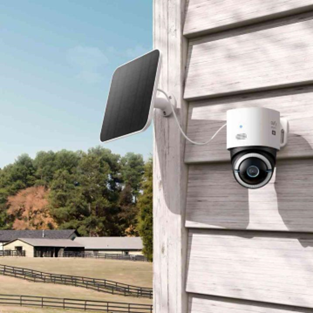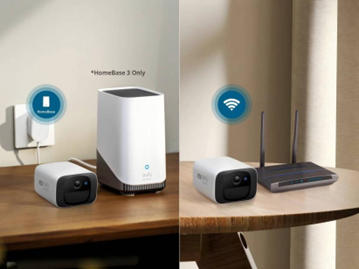Wireless outdoor security cameras are
becoming increasingly popular due to their ease of installation and
flexibility. They offer homeowners a convenient solution for monitoring their
property without the need for extensive wiring. However, questions about their
reliability often arise. Are they as dependable as their wired counterparts?
This article explores the reliability of wireless outdoor security cameras by
examining their definition and functionality, key features, pros and cons,
performance in various conditions, and maintenance needs. By understanding
these aspects, you can make an informed decision about whether wireless cameras
are the right choice for your home security.
What Are Wireless Outdoor Security Cameras?
Definition and Functionality
Wireless outdoor security cameras transmit
video and audio signals over Wi-Fi or other wireless networks. They are powered
by batteries, solar panels, or wired connections to an electrical source. These
cameras provide flexibility in placement, allowing homeowners to monitor
various areas around their property without the need for complex wiring.
Types of Wireless Cameras
There are several types of wireless outdoor
security cameras, including battery-powered, solar-powered, and hybrid models.
Battery-powered cameras are completely wireless and easy to install, while
solar-powered cameras use solar panels to extend battery life. Hybrid models
can be connected to an electrical source but also have battery backup, offering
a balance between reliability and flexibility. For example, the eufy SoloCam
S340 is solar-powered, installed once and it runs forever. Experience constant
peace of mind with this solar-powered security camera that's easy to set up and
always on, thanks to its removable solar panel.

Key Features of Wireless Cameras
Key features of wireless outdoor security
cameras include high-resolution video, night vision, motion detection, two-way
audio, and integration with smart home systems. These cameras often come with
mobile apps that allow for remote viewing and real-time alerts. Advanced models
may also offer features like facial recognition, cloud storage, and
customizable activity zones, enhancing their functionality and security
capabilities.
What Are the Pros and Cons of Wireless Outdoor Security Cameras?
Advantages of Wireless Cameras
Wireless cameras are easy to install and
highly flexible in terms of placement. They can be positioned in areas where
running cables would be difficult or impossible. The absence of wires also
reduces the risk of tampering. Additionally, many wireless cameras offer
features like mobile alerts and remote viewing, providing added convenience and
peace of mind.
Disadvantages of Wireless Cameras
The main disadvantages of wireless cameras
include potential signal interference and dependency on battery power. Wi-Fi
signals can be disrupted by other devices or physical obstructions, affecting
video quality and reliability. Regular battery maintenance is required to
ensure continuous operation, which can be inconvenient. Moreover, wireless
cameras might have higher initial costs compared to wired ones.
Comparing with Wired Cameras
While wired cameras offer more stable
connections and consistent power supply, they are less flexible in terms of
placement and require more complex installation. Wireless cameras provide
greater flexibility and easier installation but may suffer from signal
interference and battery-related issues. The choice between wired and wireless
depends on your specific needs, property layout, and preference for convenience
versus reliability.
How Do Wireless Cameras Perform in Various Conditions?
Performance in Different Weather
Conditions
Modern wireless outdoor security cameras
are designed to withstand various weather conditions, including rain, snow, and
extreme temperatures. They come with weatherproof ratings that ensure
durability and reliable performance in harsh environments. However, it's
essential to choose a camera with a high IP rating to guarantee its resilience
in extreme weather. For example, the eufyCam 2C Pro has an IP67 weatherproof
rating, boasting greater protection against the elements than any of its
competitors.
Signal and Connectivity Issues
Wireless cameras rely on Wi-Fi signals,
which can be affected by interference from other electronic devices or
obstacles like walls and trees. This interference can lead to connectivity
issues and affect video quality. Ensuring a strong and stable Wi-Fi signal is
crucial for optimal performance. Some cameras offer dual-band Wi-Fi support to
mitigate connectivity problems.

Battery Life and Power Solutions
Battery life is a critical factor for
wireless cameras. Most models provide several months of battery life, but this
can vary depending on usage and environmental factors. Solar-powered options
can extend battery life by providing continuous charging during daylight hours.
Regularly checking and maintaining battery levels is essential to ensure
uninterrupted operation.
What Are the Maintenance Needs of Wireless Outdoor Security Cameras?
Regular Battery Checks
Wireless outdoor security cameras require
regular battery checks to ensure they remain operational. Depending on the
model, batteries may need to be recharged or replaced every few months.
Solar-powered cameras can reduce the frequency of battery maintenance but still
require occasional checks to ensure the solar panels are functioning correctly.
Software and Firmware Updates
Keeping the camera’s software and firmware
up to date is crucial for maintaining security and performance. Manufacturers
frequently release updates to address vulnerabilities, improve functionality,
and add new features. Regularly checking for and installing these updates
ensures that your camera operates at its best and remains secure against
potential threats.
Physical Maintenance and Cleaning
Outdoor cameras are exposed to various
elements that can affect their performance. Regular cleaning of the camera lens
and housing is necessary to prevent dirt, dust, and debris from obstructing the
view. Inspecting the camera for any signs of physical damage and ensuring that
all components are securely attached can help maintain optimal performance.
Conclusion
Wireless security camera outdoor offer numerous benefits, including easy installation and
flexible placement. However, their reliability can be influenced by factors
such as signal strength, battery life, and maintenance requirements. By
understanding these aspects, you can determine if wireless cameras are suitable
for your security needs. While they provide convenient and adaptable security
solutions, it’s essential to ensure proper maintenance and choose high-quality
models to maximize their reliability. Consider your specific requirements and
weigh the pros and cons to make an informed decision about using wireless
outdoor security cameras for your home.
